Finishing methods for OSB boards
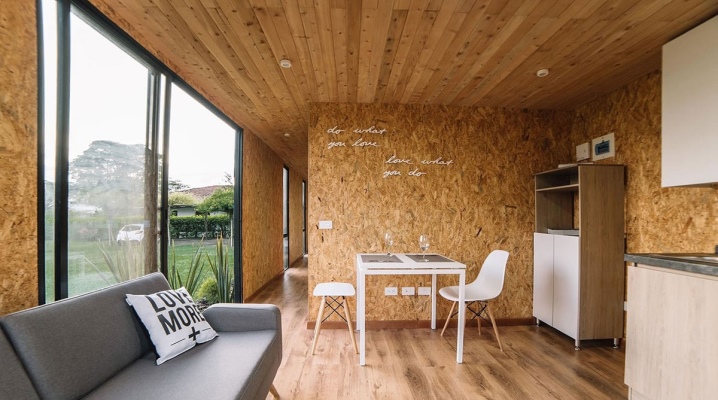
Sheet materials in construction are not new for a long time. Once it was plywood, chipboard, fiberboard, today these materials are confidently promoted by OSB. Oriented strand boards have evolved from finishing materials, substrates, into an independent decorative material. So, temporary wall cladding becomes permanent, and if you turn on your imagination, the slabs can be luxuriously decorated with firing, painting and other more creative options. In many cases, such decor is aesthetic, stylish, and inexpensive.
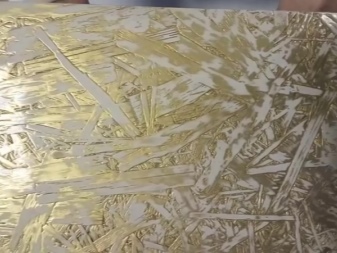
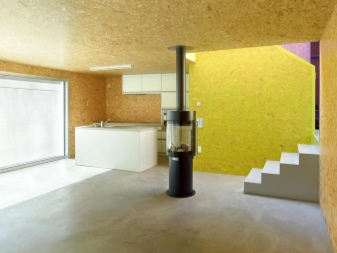
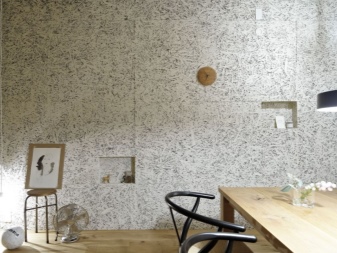
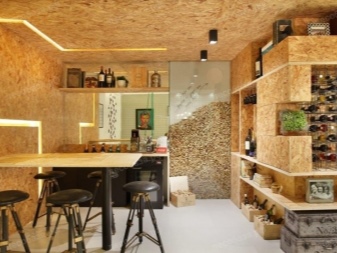
Peculiarities
OSB is a panel made of pressed softwood shavings (mainly softwood). The dimensions of the chips taken for the panels are from 60 to 150 mm. This is a high-strength, dense material, as it combines several layers. In the very middle, the chips are located across the board, in the lower and upper layers - along. All layers are pressed under high temperature and pressure, they are impregnated with resins (phenol and formaldehyde).
Attention! Each finished board must be uniform in structure. Chips and cracks, irregularities are excluded. If they are, the material is defective.
For finishing OSB (or OSB, as plates are often called in connection with the abbreviation in English), it is used more and more actively. But the plates are different, you need to look at the product labeling: the coefficient of conditionally harmful resins that emit fumes will be indicated there. The maximum of these toxic substances is present in OSB class E2 and E3, but E0 or E1 contain a minimum amount of harmful elements.

How not to miscalculate with OSB - learning to choose
- If there are a lot of poisonous components in the stove, a characteristic chemical smell will come from it, very expressive. It will smell like cheap plastic and formalin.
- The products must be certified, the certificate must bear the manufacturer's / supplier's stamp. The seller, by the way, the buyer has the right to demand a copy of the certificate of conformity.
- If you inspect the packaging, it should contain inserts with markings (and, accordingly, with an indication of the class).
OSB is often used to create interior room partitions. Affordable cost, strength and lightness appeal to the buyer. And you can fix the material on a metal profile or on a wooden frame.
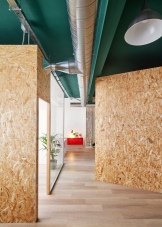


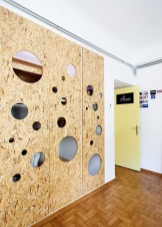
Ways to decorate the walls inside
The manufacturer offers the buyer 2 types of plates - with and without grinding. If the walls or ceiling are sheathed with unpolished sheets, you will have to prepare the sheets before finishing. This is done with a grinder or grinder with a grinding wheel put on.
Painting
On the one hand, this is the easiest way of finishing that you can do yourself. It seems that everyone knows how to paint. On the other hand, the adhesion of OSB is minimal, and the paint that is applied to the board is rather difficult to adhere to. If, moreover, the conditions for using the stove are not the most delicate, after a couple of years the paint will peel off. It is about finishing panels outside the house.
It's one thing if the decor concerns a farm building, one that is not in sight - there are fewer requirements for it, and you can repaint once a year. But the facade of the house requires a more serious decision, and every year no one will paint it for sure.
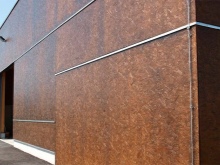


Painting tips.
- Use special high adhesion primers. They are sold in cans with markings, the name saying "Primer-paint for OSB". The material is sold only in white, but tinting is always possible.
- The dried surface must be sanded again, then paint, patina or varnish should be applied.
- If no primer is found, putty will do, although in this case you will need a layer of primer-paint on top (just without a standard primer in the first stage).
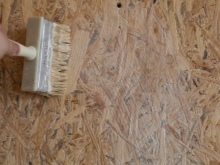

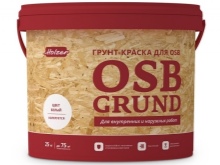
You can use various decorative techniques: arrange paints, work in contrast, use a stencil and drawings. It all depends on what area you have to decorate - the facade or the interior. Color compatibility can be seen on the color wheel. The solution of painting OSB in white remains popular: the texture of the material still peeps out from under the paint - it turns out stylishly.
Not the rarest solution is to leave a fragment of the wall unpainted, but clearly geometric, so that the deliberateness of such a technique is understood.
The final finish uses color combinations that support the overall look of the interior.
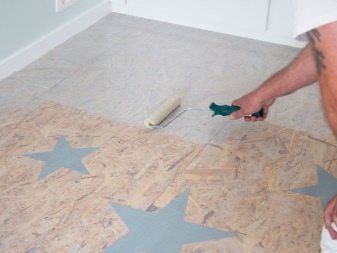
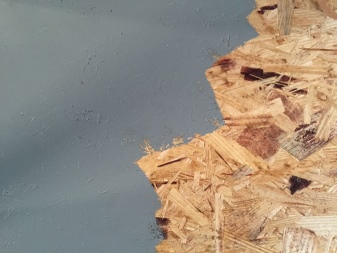


Ceramic tile
Of course, tiling always implies only interior solutions - it will not work outside to decorate. It is possible to glue tiles, tiles on OSB, but only with a serious approach to the adhesive composition. In the instructions, the labeling must indicate that the composition is suitable for gluing to OSB.
Dry mixtures in this situation are not actually used, but glue in cylinders will come in handy: semi-liquid adhesive is very similar to liquid nails. This mixture has enhanced characteristics and the highest adhesion. The glue is applied to the tile diagonally and along the perimeter, the tile is pressed onto the OSB, fixing it with your hands for a while (but not for very long, the glue should set quickly if it is suitable).



But to prime the plate for subsequent adhesion to ceramics or not is a moot point. Someone is reinsured and does this and, in principle, does not lose. Someone thinks that the glue itself has priming properties and that is quite enough.
In any case, ceramic tiles are a good option if the OSB sheathing zones the partition in the combined kitchen-living room, for example. And sometimes a countertop for a bar counter or a coffee table is made from OSB and also laid out with tiles. It turns out very cool, such techniques are in vogue today.
A tabletop with a tiled surface will be an incredibly cool photo background - for those who like activities in social networks, this is important.



Wallpaper
Wallpaper of different types, fiberglass is also glued to OSB, but you should think in advance whether to do this. Sticking can be problematic. You need a good primer, and always in two layers. Then, in the next step, interior paint is applied to the OSB. And only on dried paint, experts advise sticking wallpaper.
Such decor is too expensive. Plus - what could be decisive - gluing OSB wallpaper on the wall is simply stupid. Indeed, in this way, the texture of the wood material, which is unusual from the point of view of decorative possibilities, remains hidden. And it is interesting in itself - under varnish, paint, other solutions, but not completely camouflaged with wallpaper.



How to finish the floor?
There are basically two finishing options - varnish and paint. The paint, as already noted, only needs a certain one, suitable specifically for working with OSB. It is categorically not worth taking paint for outdoor use due to its excessive toxicity in the premises.
The painting algorithm itself is as follows:
- putty the joints of the plates and the caps of the screws - the putty is needed to match the plates (if you want to keep it), and the one that is marked "for wooden surfaces";
- sand the treated areas with sandpaper;
- remove fine dust and debris;
- prime the plates;
- apply a thin and even putty layer;
- apply paint with a roller or a brush, in two layers, each completely drying.



If it is decided to close the plates in the room with varnish, the actions will be slightly different. First, you need to seal all the gaps on the floor and the caps of the screws with acrylic putty for wood. Then sand the dried areas.Then the boards are primed and a thin layer of acrylic putty is applied to the surface. Parquet varnish is applied by brush or roller.
The varnish is smoothed with a spatula - this is necessary for the uniformity and uniformity of the layer, it should not be very thick.


How to sheathe the outside of the house?
One of the acceptable for many options for finishing OSB is siding. It starts immediately after the construction of the building. On the facade, siding lamellas are stacked from bottom to top. You can also mount from one corner to another, but the dimensions of the wall and profile in this case may not match.


Another option for outdoor decoration is to ennoble the slabs with decorative stone. Not only facades, by the way, are sheathed with them, but also plinths. The material does not affect the foundation and is easy to install. It looks stylish and realistic.
The decorative stone is mounted either on glue or on a frame.

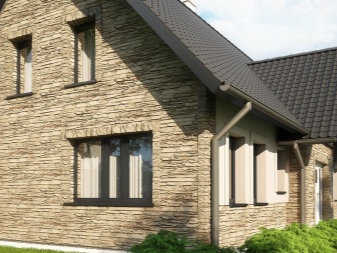
Separately, it is worth talking about how OSB helps to embody an interesting half-timbered style in your own home. Fachwerk is a technique for finishing facades of frame buildings, which has been used in Europe for over 200 years. The style was formed due to banal economy: there were not enough building materials, it was necessary to strengthen the walls and decorate, since full-fledged cladding did not work out.
This style is closely related to the design and construction of the frame itself. In particular, the famous Finnish houses.



Fachwerk and OSB - the most basic:
- the correct design of the frame excludes the very trimming of the OSB during wall cladding;
- it is necessary to embroider the facade of the house with decorative lines so that all openings between the finishing elements are of the correct and equal geometric shape, therefore only solid plates can be used;
- wooden boards in this style are located along the lines of force of the frame, the main and main element of the style is "dovetail", that is, the connection point of three boards, one of which is vertical, and the others are located diagonally;
- for facing the slabs, boards are used from both planed and non-planed wood, which must be treated with an antiseptic;
- finally, it is better to paint a half-timbered house, the colors should be harmonious - someone uses transparent coatings, but still the natural color of the slabs rarely remains;
- the optimal choice of staining OSB in the frame are covering enamels, tinting impregnations, stain;
- they usually paint the facades with sprayers or rollers, it is imperative that the painting is preceded by a primer (2 layers may be required);
- work on painting OSB should be carried out only when the temperature is positive and only on the dry surface of the walls;
- decorative boards are fixed after the painted boards have dried.


Sometimes the Finnish house is not painted, but revetted with the same siding with the maximum imitation of lining, facade panels "like a brick", decorative plaster. This is one of the most popular style trends in construction - half-timbered, and the budget of the project contributed a lot to this popularity.
See the way to creatively color the OSB board in the video below.













The comment was sent successfully.